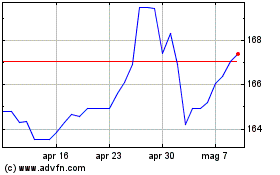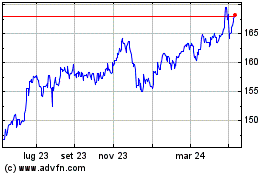Euro Falls On Weak Eurozone PMI Data
23 Settembre 2024 - 10:16AM
RTTF2
The euro weakened against other major currencies in the European
session on Monday, after data showed that the Eurozone business
activity contracted more than expected in September.
Data from S&P Global showed that Eurozone business activity
contracted more than expected in September, with the corresponding
PMI falling to 48.9 from 51.0 as both services and manufacturing
sectors weakened.
Also, data from S&P Global showed that German private sector
activity fell deeper into contraction in September with accelerated
reduction in manufacturing output. At 47.2, the headline HCOB
composite output index fell to a seven-month low in September from
48.4 in August. The score was forecast to fall moderately to
48.2.
Morever, the indications of further weakness would increase
market anticipation for a third interest rate cut by the European
Central Bank (ECB) in October.
European stocks were traded lower as investors reacted to weak
business activity data and the latest political developments in the
region.
Similarly, growth softened across U.K. businesses in
September.
In political news, German Chancellor Olaf Scholz's Social
Democratic Party (SPD) has narrowly beaten the far-right
Alternative for Germany (AfD) in an election in the east German
state of Brandenburg, according to official results released this
morning.
In France, Prime Minister Michel Barnier said his new government
could increase taxes for big business and the wealthiest to help
tackle the budget deficit.
Elsewhere in the U.K., Finance Minister Rachel Reeves said there
would be no return to austerity or widespread cuts despite
financial challenges.
In the European trading today, the euro fell to more than a
2-year low of 0.8356 against the pound, from an early high of
0.8387. The EUR/GBP pair may test support near the 0.81 region.
On economic news, data published by S&P Global showed that
U.K. private sector activity logged a further sustained growth in
September despite easing since August. The flash composite output
index dropped to 52.9 in September from 53.8 in August. The
services business activity index stood at 52.8 in September, down
from 53.7 in August. The expected score was 53.5.
The manufacturing Purchasing Managers' Index declined to a
3-month low of 51.5 from 52.5 in August. Economists expected a
reading of 52.3.
Against the Swiss franc and the U.S. dollar, the euro dropped to
4-day lows of 0.9435 and 1.1083 from early highs of 0.9503 and
1.1168, respectively. If the euro extends its downtrend, it is
likely to find support around 0.92 against the franc and 1.09
against the greenback.
The euro edged down to 159.05 against the yen, from an early
near 3-week high of 161.19. The EUR/JPY pair is likely to find
support near the 155.00 region.
Against the Australia, the New Zealand and the Canadian dollars,
the euro slipped to a 3-week low of 1.6278, nearly a 3-week low of
1.7766 and a 1-week low of 1.5049 from early highs of 1.6391,
1.7912 and 1.5140, respectively. On the downside, 1.60 against the
aussie, 1.76 against the kiwi and 1.48 against the loonie are seen
as the next support levels for the euro.
Looking ahead, Canada new housing price index for August, U.S.
Chicago Fed national activity index for August and U.S. S&P
Global flash PMI data for September are slated for release in the
New York session.
Grafico Cross Euro vs Yen (FX:EURJPY)
Da Nov 2024 a Dic 2024

Grafico Cross Euro vs Yen (FX:EURJPY)
Da Dic 2023 a Dic 2024
